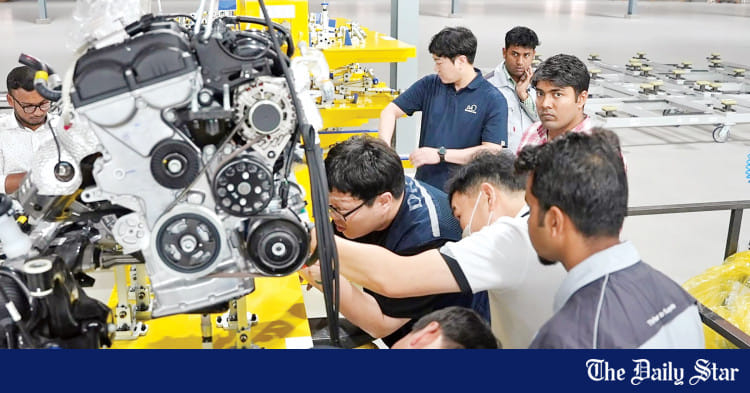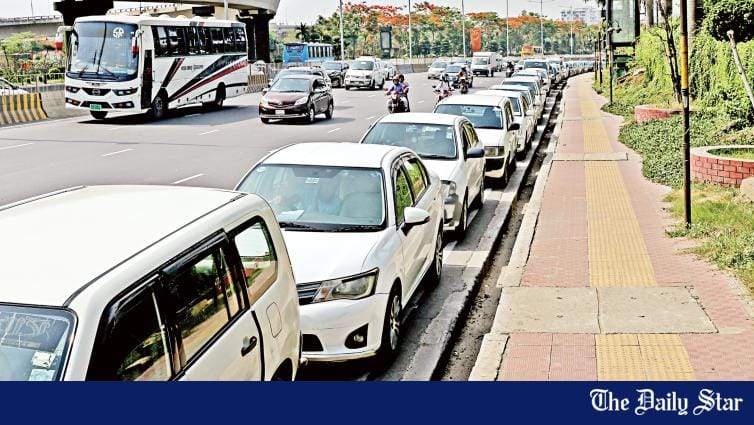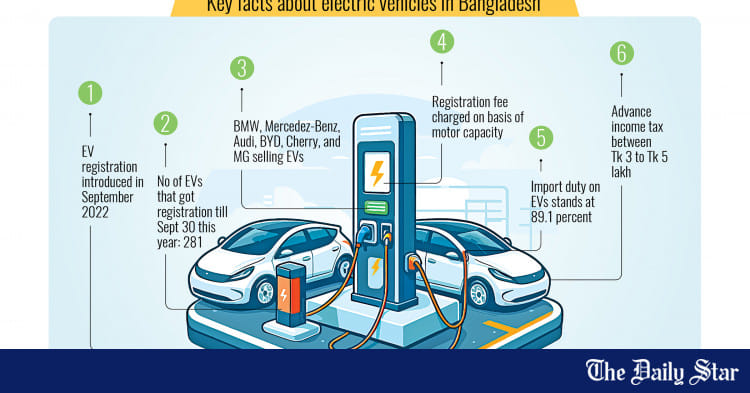- Copy to clipboard
- Thread starter
- #31

Assembled by Meghna, three brand new KIA SUVs hit the road
Meghna Automobiles, the automotive arm of Meghna Group, began selling three locally assembled sport utility vehicles (SUVs) of South Korean automobile manufacturer KIA recently.
Assembled by Meghna, three brand new KIA SUVs hit the road

Meghna Automobiles is all set to roll out three models of KIA cars that are being assembled at its factory in Barmi of Gazipur. The three models are all sport utility vehicles with engine capacities of 1,500cc to 2,000cc. PHOTO: COLLECTED
Meghna Automobiles, the automotive arm of Meghna Group, began selling three locally assembled sport utility vehicles (SUVs) of South Korean automobile manufacturer KIA recently.
According to officials, the official launch of the three cars is scheduled to be held soon.
The SUVs are the 1,500cc Seltos, 1,500cc Carens, and 2,000cc Sportage, said Anisuzzaman Choudhury, executive director of Meghna Automobiles.
The Seltos and Carens models were showcased at the Dhaka Motor Show in May this year.
Choudhury said Meghna Automobiles has already obtained type certification for the cars from the Bangladesh Road Transport Authority (BRTA).
Type certification is a mandatory specification for locally assembled cars to be sold in the market.
"We are now ready to launch the vehicles officially," he said. "Our goal is to provide brand-new passenger cars at a lower price than it would cost to import."
Meghna Automobiles established its assembly plant for completely knocked down (CKD) cars on 15 acres of land at Barmi union of Gazipur at a cost of Tk 275 crore, which is equivalent to around $25 million.

According to Choudhury, the price of locally assembled Seltos is around Tk 43 lakh compared to around Tk 52 lakh for those imported as completely built-up (CBU) units.
Similarly, the locally assembled Sportage costs Tk 58 lakh while the CBU unit is priced at Tk 78 lakh.
Choudhury said prices of brand-new locally assembled cars are expected to be Tk 10-12 lakh lower than those imported as CBU units.
However, the sharp depreciation of the local currency taka against the US dollar has limited the price drop to only Tk 8 lakh per unit, he said.
As per Bangladesh's automobile policy, there are lower customs duties on importing various components of vehicles for assembly purposes, he added.
Regarding the quality of locally assembled KIA cars, Choudhury said Korean engineers and technicians would operate the Gazipur assembly plant for the first two years to ensure original quality.
By that time, local engineers and technicians will have built up efficiency and ensured quality, he said.
Currently, Hyundai, South Korea's leading automobile manufacturer, Malaysian automotive company Proton, and renowned Japanese manufacturer Mitsubishi assemble passenger cars in Bangladesh.
According to market insiders, imported reconditioned Japanese cars dominated the local automobile market while brand-new cars hold around 18 percent of the market share.
Referring to market assessments, Choudhury said brand-new cars would dominate the market by 2030 as user awareness and affordability increase.
He said customers do not need to renew the fitness certificate for five years after the purchase of a new car. In contrast, reconditioned cars require annual fitness certificate renewals.

According to BRTA data, an average of 22,000 to 24,000 passenger vehicles, have been sold per year since 2014.
Choudhury said KIA and Meghna Automobiles teamed up to assemble cars in Bangladesh after observing the growing market for brand-new cars, focusing on SUVs to capture the expanding market.
According to him, Meghna Automobiles has the capacity to assemble 7,000 cars per year but will initially assemble 3,500 units per year.
Besides, Meghna will ensure the availability of spare parts and sufficient service centres across the country.
Meghna Automobiles is all set to roll out three models of KIA cars that are being assembled at its factory in Barmi of Gazipur. The three models are all sport utility vehicles with engine capacities of 1,500cc to 2,000cc. PHOTO: COLLECTED
Meghna Automobiles, the automotive arm of Meghna Group, began selling three locally assembled sport utility vehicles (SUVs) of South Korean automobile manufacturer KIA recently.
According to officials, the official launch of the three cars is scheduled to be held soon.
The SUVs are the 1,500cc Seltos, 1,500cc Carens, and 2,000cc Sportage, said Anisuzzaman Choudhury, executive director of Meghna Automobiles.
The Seltos and Carens models were showcased at the Dhaka Motor Show in May this year.
Choudhury said Meghna Automobiles has already obtained type certification for the cars from the Bangladesh Road Transport Authority (BRTA).
Type certification is a mandatory specification for locally assembled cars to be sold in the market.
"We are now ready to launch the vehicles officially," he said. "Our goal is to provide brand-new passenger cars at a lower price than it would cost to import."
Meghna Automobiles established its assembly plant for completely knocked down (CKD) cars on 15 acres of land at Barmi union of Gazipur at a cost of Tk 275 crore, which is equivalent to around $25 million.
According to Choudhury, the price of locally assembled Seltos is around Tk 43 lakh compared to around Tk 52 lakh for those imported as completely built-up (CBU) units.
Similarly, the locally assembled Sportage costs Tk 58 lakh while the CBU unit is priced at Tk 78 lakh.
Choudhury said prices of brand-new locally assembled cars are expected to be Tk 10-12 lakh lower than those imported as CBU units.
However, the sharp depreciation of the local currency taka against the US dollar has limited the price drop to only Tk 8 lakh per unit, he said.
As per Bangladesh's automobile policy, there are lower customs duties on importing various components of vehicles for assembly purposes, he added.
Regarding the quality of locally assembled KIA cars, Choudhury said Korean engineers and technicians would operate the Gazipur assembly plant for the first two years to ensure original quality.
By that time, local engineers and technicians will have built up efficiency and ensured quality, he said.
Currently, Hyundai, South Korea's leading automobile manufacturer, Malaysian automotive company Proton, and renowned Japanese manufacturer Mitsubishi assemble passenger cars in Bangladesh.
According to market insiders, imported reconditioned Japanese cars dominated the local automobile market while brand-new cars hold around 18 percent of the market share.
Referring to market assessments, Choudhury said brand-new cars would dominate the market by 2030 as user awareness and affordability increase.
He said customers do not need to renew the fitness certificate for five years after the purchase of a new car. In contrast, reconditioned cars require annual fitness certificate renewals.
According to BRTA data, an average of 22,000 to 24,000 passenger vehicles, have been sold per year since 2014.
Choudhury said KIA and Meghna Automobiles teamed up to assemble cars in Bangladesh after observing the growing market for brand-new cars, focusing on SUVs to capture the expanding market.
According to him, Meghna Automobiles has the capacity to assemble 7,000 cars per year but will initially assemble 3,500 units per year.
Besides, Meghna will ensure the availability of spare parts and sufficient service centres across the country.















